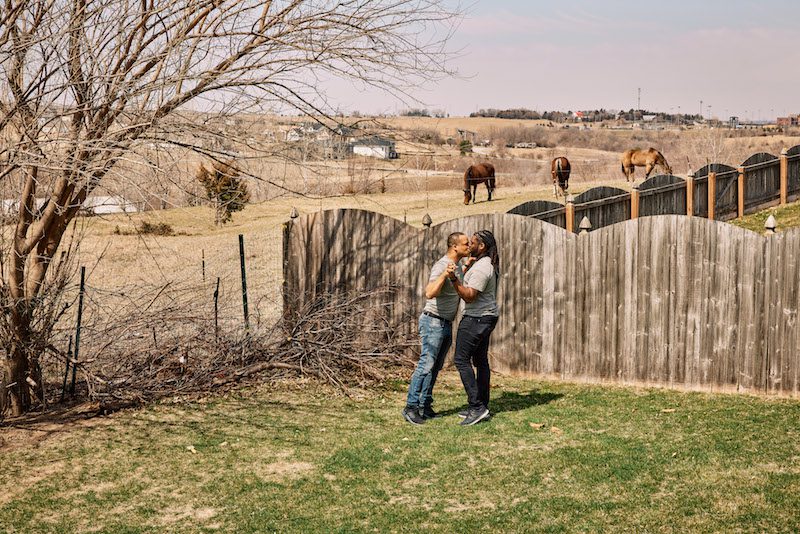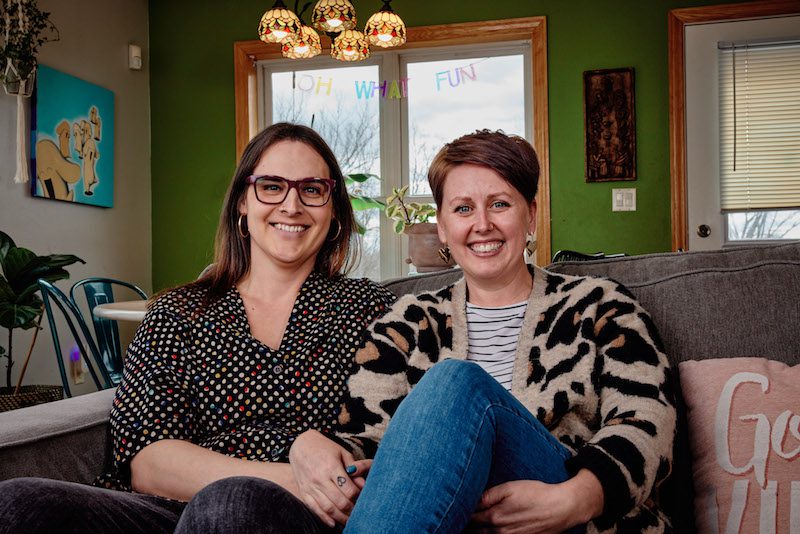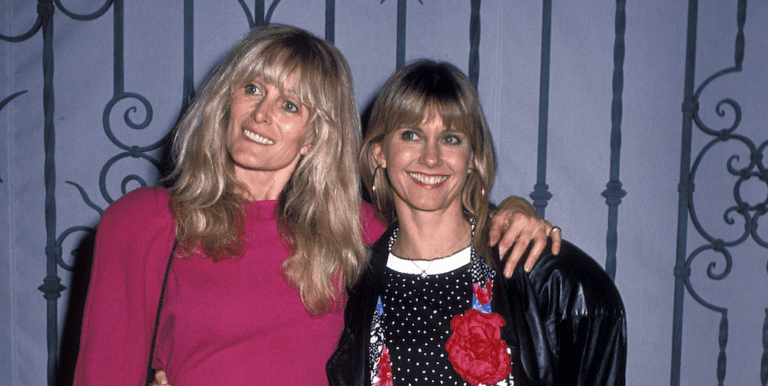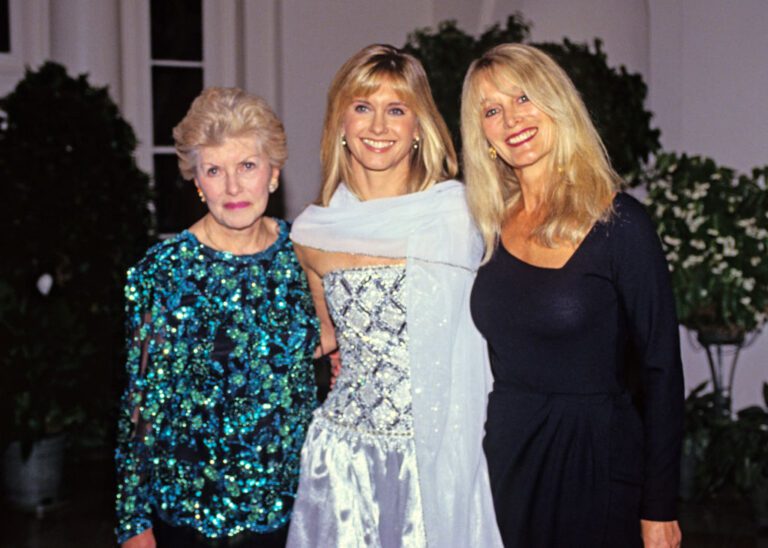The U.S. is not alone in dealing with resistance towards gay and LGBTQ communities. Although same-sex marriage became legal in Australia in 2017, many still struggle against discrimination on a daily basis.
What Miller and Maerker were able to achieve through We Live Here is to normalise the LGBTQ experience. Throughout the documentary we see ordinary people making the school run, cooking dinner, getting along (or not) with their respective families.
It begs the question, if gay marriage in America became legal in 2015, why are we still talking about this issue?
What was the impetus for this project?
David Miller: After the 2016 elections, we became concerned. It seemed that things had gone backwards for the LGBTQ communities. There was a passage of marriage equality and then there seemed to be a great backlash.
Why shine a light on America’s Midwest?
Melinda Maerker: It is the heartland of U.S. family values and we thought that there’s an irony in that if those values are not including everyone.
David Miller: For me personally as a gay father, I was very interested to see how gay families were faring once the passage of marriage equality happened. I think that there was a general sense of joy and relief for so many gay families that they were going to be recognised and have rights. And I think what has happened since is, as we saw when black people were able to vote and when females were able to vote, there was a backlash. When you see something becoming real, I think some people get upset about that. There was a far right, very Christian conservative movement having issues with the fact that marriage equality passed. And I think we are seeing that today.
And it wouldn’t have helped matters when Trump was in office.
Melinda Maerker: I think the conservative movement in particular seemed to be emboldened to be extremely discriminatory. I don’t think it went away, but I think they were empowered to suddenly engage in some very hateful rhetoric.
I wasn’t sure what to expect from watching the film, and I have to say it felt unexpectedly uplifting. If you set out to normalise the lifestyles of gay and trans families, you did it brilliantly.
David Miller: That was very much designed. We did not set out to create a controversial documentary, that was not our intent. What we wanted to do was show real families in real life situations. It was important for Melinda and I to make audiences aware that these people have rights and need to be respected, just like any other family that has the burden of financial responsibility and health issues, gay families experience the same thing, if not a little bit more. They also have discrimination amongst their church members, their communities, and their job situation. So, it was important to show that these families have these burdens, but they are also very joyful.
Where did you find the people to participate in the movie? Were a lot of people reticent to be involved?
Melinda Maerker: Yes! To answer the second part of the question first (laughs). It was not an easy process. We reached out to different organisations. We went to social media quite a bit, and sometimes it was just a network of personal friends of friends of friends. And yes, many families were reticent to participate, given increased discrimination they might face were they to be so obvious in the public eye. So that’s why we really think of these families as being especially courageous that they did participate with us.
David Miller: There were many that politely declined, because they were worried about their job and their job was too important for them to risk.
I’m sure some people watching will say, ‘Why don’t you move out of the Midwest and go somewhere more accepting?’
Melinda Maerker: Aside from any economic issues, why should you have to move? It’s not against the Midwest, rather looking at families who want to stay where they are, they just want to be treated like everyone else.
Why do you think people still find the idea of gay or trans relationships such a threat?
Melinda Maerker: Fear.
David Miller: Well, yeah, for one fear. We didn’t set out to create a controversial documentary but I think the timing of this release, right now when, Melinda and I went into these families’ homes, we went into their communities, we spoke to their friends and to see this documentary coming out that this time when the third most powerful individual in Government holds such antagonistic and dangerous views towards gay people, that’s scary for me as a gay man. There are many people that do not like marriage equality and would like to reverse that. And that scares me.
With all the hoopla that’s around Caitlyn Jenner when she came out, do you think that helped or hindered the trans community?
Melinda Maerker: It’s a good question.
David Miller: Yeah, as a cis-gendered man, I couldn’t speak to that because I am not in that community. I would imagine that some felt that it was helpful and some probably felt that it wasn’t. But it’s hard for me to know about that because I am not part of that group.

What do you hope audiences will walk away with after watching this?
Melinda Maerker: Several things. I think what’s interesting with the families is that they all feel that it’s becoming a more fearful climate in the U.S., period. And that’s a bit scary for all of us. As David said, it’s scary to him as a gay man. It’s scary to me as a lesbian. And I think it’s scary to people.
David Miller: Yeah, again, the second person in line to the Presidency has well documented anti-gay views and a wife that actively promotes that homosexuality is a sin. I think these families are concerned about that. As a gay man, I am concerned about that, particularly where we are in 2023 and we have an election coming up. So, I think that, that is important to remember when looking at these families and recognizing these are just ordinary families. Love is love, they have children just like everybody else, or every other family I should say, and they are not really much different. They deserve to be respected and you should treat them with decency.
David, just on a personal note, you are the husband of Ryan Murphy. I just wondered, as both creatives in a relationship, do you consult on each other’s projects, do you read his scripts, does he weigh in what you are doing, or do you keep that separate?
David Miller: No, we keep it separate. I think that was decided very early on in our relationship that it would be best to do that. Families and raising children can be complicated enough and when you start getting into each other’s work and whatnot, I think it was an issue that we just wanted to avoid from the very get-go.
And Melinda, what is your background, are you married, do you have kids?
Melinda Maerker: I have been with my female partner for ten years. We have three dogs who we consider like most lesbians, to be our children, adopted from Korea. But I find that often we are the surrogate aunts to so many children in our community. So it gives a perspective on those families. And a lot of our friends are in the queer community, so it does take a village. So it’s certainly close to my heart how these children are going to feel that they fit into our world.
David Miller: It’s also worth noting there are many people that when they do come out, they are often ostracised by their family. And so they seek out friendships with others who are not family and it becomes a family, which is the reason why we wanted to show Russ and Mark [a couple in the documentary], because we didn’t feature their own children, we featured the children that they have taken in as part of their family. And I think that is an important message for many gay people to know, that your parents may reject you, but there will be people that will love you like a family.







